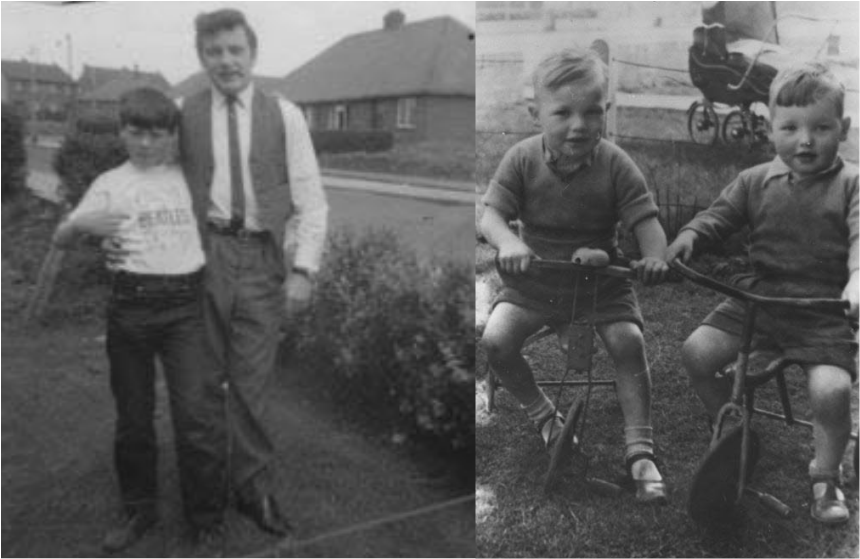- Home
- Site Index
- About Me
-
My Books
- Book List & Themes
- Strictly for Adults Novels >
-
Tales from Portlaw
>
- No Need to Look for Love
- 'The Love Quartet' >
-
The Priest's Calling Card
>
- Chapter One - The Irish Custom
- Chapter Two - Patrick Duffy's Family Background
- Chapter Three - Patrick Duffy Junior's Vocation to Priesthood
- Chapter Four - The first years of the priesthood
- Chapter Five - Father Patrick Duffy in Seattle
- Chapter Six - Father Patrick Duffy, Portlaw Priest
- Chapter Seven - Patrick Duffy Priest Power
- Chapter Eight - Patrick Duffy Groundless Gossip
- Chapter Nine - Monsignor Duffy of Portlaw
- Chapter Ten - The Portlaw Inheritance of Patrick Duffy
- Bigger and Better >
- The Oldest Woman in the World >
-
Sean and Sarah
>
- Chapter 1 - 'Return of the Prodigal Son'
- Chapter 2 - 'The early years of sweet innocence in Portlaw'
- Chapter 3 - 'The Separation'
- Chapter 4 - 'Separation and Betrayal'
- Chapter 5 - 'Portlaw to Manchester'
- Chapter 6 - 'Salford Choices'
- Chapter 7 - 'Life inside Prison'
- Chapter 8 - 'The Aylesbury Pilgrimage'
- Chapter 9 - Sean's interest in stone masonary'
- Chapter 10 - 'Sean's and Tony's Partnership'
- Chapter 11 - 'Return of the Prodigal Son'
- The Alternative Christmas Party >
-
The Life of Liam Lafferty
>
- Chapter One: ' Liam Lafferty is born'
- Chapter Two : 'The Baptism of Liam Lafferty'
- Chapter Three: 'The early years of Liam Lafferty'
- Chapter Four : Early Manhood
- Chapter Five : Ned's Secret Past
- Chapter Six : Courtship and Marriage
- Chapter Seven : Liam and Trish marry
- Chapter Eight : Farley meets Ned
- Chapter Nine : 'Ned comes clean to Farley'
- Chapter Ten : Tragedy hits the family
- Chapter Eleven : The future is brighter
-
The life and times of Joe Walsh
>
- Chapter One : 'The marriage of Margaret Mawd and Thomas Walsh’
- Chapter Two 'The birth of Joe Walsh'
- Chapter Three 'Marriage breakup and betrayal'
- Chapter Four: ' The Walsh family breakup'
- Chapter Five : ' Liverpool Lodgings'
- Chapter Six: ' Settled times are established and tested'
- Chapter Seven : 'Haworth is heaven is a place on earth'
- Chapter Eight: 'Coming out'
- Chapter Nine: Portlaw revenge
- Chapter Ten: ' The murder trial of Paddy Groggy'
- Chapter Eleven: 'New beginnings'
-
The Woman Who Hated Christmas
>
- Chapter One: 'The Christmas Enigma'
- Chapter Two: ' The Breakup of Beth's Family''
- Chapter Three: From Teenager to Adulthood.'
- Chapter Four: 'The Mills of West Yorkshire.'
- Chapter Five: 'Harrison Garner Showdown.'
- Chapter Six : 'The Christmas Dance'
- Chapter Seven : 'The ballot for Shop Steward.'
- Chapter Eight: ' Leaving the Mill'
- Chapter Ten: ' Beth buries her Ghosts'
- Chapter Eleven: Beth and Dermot start off married life in Galway.
- Chapter Twelve: The Twin Tragedy of Christmas, 1992.'
- Chapter Thirteen: 'The Christmas star returns'
- Chapter Fourteen: ' Beth's future in Portlaw'
-
The Last Dance
>
- Chapter One - ‘Nancy Swales becomes the Widow Swales’
- Chapter Two ‘The secret night life of Widow Swales’
- Chapter Three ‘Meeting Richard again’
- Chapter Four ‘Clancy’s Ballroom: March 1961’
- Chapter Five ‘The All Ireland Dancing Rounds’
- Chapter Six ‘James Mountford’
- Chapter Seven ‘The All Ireland Ballroom Latin American Dance Final.’
- Chapter Eight ‘The Final Arrives’
- Chapter Nine: 'Beth in Manchester.'
- 'Two Sisters' >
- Fourteen Days >
-
‘The Postman Always Knocks Twice’
>
- Author's Foreword
- Contents
- Chapter One
- Chapter Two
- Chapter Three
- Chapter Four
- Chapter Five
- Chapter Six
- Chapter Seven
- Chapter Eight
- Chapter Nine
- Chapter Ten
- Chapter Eleven
- Chapter Twelve
- Chapter Thirteen
- Chapter Fourteen
- Chapter Fifteen
- Chapter Sixteen
- Chapter Seventeen
- Chapter Eighteen
- Chapter Nineteen
- Chapter Twenty
- Chapter Twenty-One
- Chapter Twenty-Two
-
Celebrity Contacts
-
Thoughts and Musings
- Bereavement >
- Nature >
-
Bill's Personal Development
>
- What I'd like to be remembered for
- Second Chances
- Roots
- Holidays of Old
- Memorable Moments of Mine
- Cleckheaton Consecration
- Canadian Loves
- Mum's Wisdom
- 'Early life at my Grandparents'
- Family Holidays
- 'Mother /Child Bond'
- Childhood Pain
- The Death of Lady
- 'Soldiering On'
- 'Romantic Holidays'
- 'On the roof'
- Always wear clean shoes
- 'Family Tree'
- The importance of poise
- 'Growing up with grandparents'
- Love & Romance >
- Christian Thoughts, Acts and Words >
- My Wedding
- My Funeral
- Audio Downloads
- My Singing Videos
- Bill's Blog
- Contact Me
'Roots'
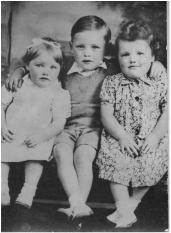
I am essentially a working class lad from materially poor circumstances who has always been intelligent enough to take advantage of the breaks and positive experiences in life that have come my way; enough that is to have found peace, happiness and contentment during my journey. I discovered very early on in life that the gateway to having sufficient friends and acquaintances is to always be a little kinder than is necessary, to always speak truthfully and be fair in all your dealings. It also helps considerably in keeping the peace if you are able to leave some things 'unsaid'. Know that happiness is 'learning to like what you get' and 'not always getting what you like'!
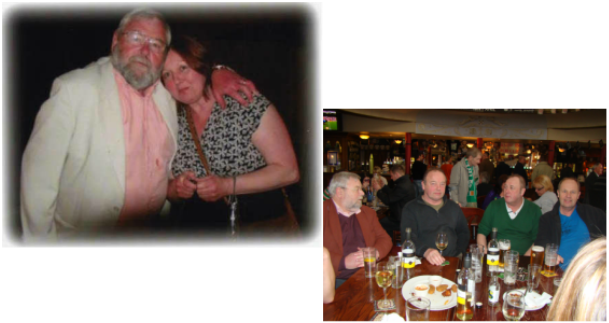
My happiness is also greatly enhanced by having six brothers and sisters. All of my life, the closeness between me and my next two sisters in line, Mary and Eileen, have been a blessing I would never have chosen to have been without. Now that I am older, I am also pleased to find that the closeness between myself and other sister, Susan, gets greater year upon year, along with my brothers Patrick, Peter and Michael.
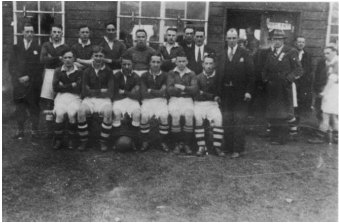
I came to England from Ireland at the age of four years. During the next ten years, my mother had seven children in total. My father played professional soccer for Ireland in his early 20s, but came to work as a miner in England down the pits during the Second-World-War years. During our early years in England, our family lived in a one roomed tied-cottage in Liversedge, West Yorkshire.
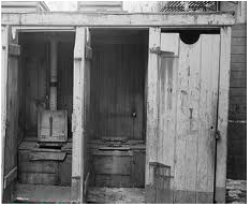
At the age of 10 years, it felt like the family had been transported to heaven when we were allocated a newly-built three-bedroomed council house on nearby Windybank Estate. The house had its own lavatory both 'inside and outside', a bathroom and a garden big enough to have a lawn, grow cabbages and still have room enough left to kick a ball. Oh so different to the cold-brick outside lav that our family once shared with
the house next door.
the house next door.
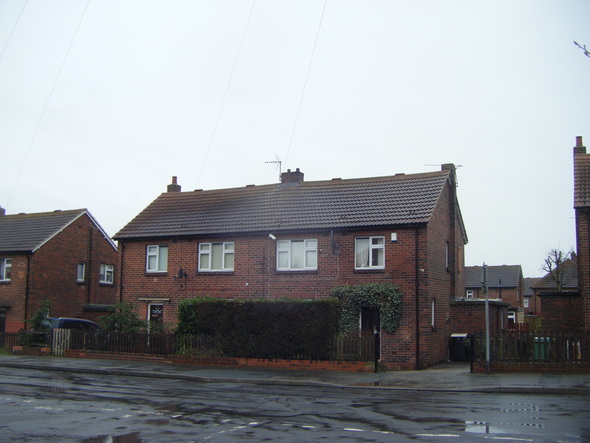
Overnight, the parents and the children of the household progressed from sleeping in one bedroom to three bedrooms. Instead of sleeping 'top to tail' in one bed, we now three beds and only needed to double up. Instead of looking into the feet of one our siblings we could now see their face at our nose end. Being only two years difference in age between me and my next two siblings, I found myself with the penalty of only having to share my bed with two sisters. If that happened today, we'd all be carted off to a Children’s Home and my parents would be imprisoned for moral impropriety. It stills gives me pleasure to taunt the partners of my sisters Mary and Eileen today, that I shared a bed with them long before they ever did!
I recently drove through the estate where we once lived in Windybank and saw our house on 19, 8th Avenue where we'd spent many happy years. The current owners had grown a large hedge in front of the house to provide privacy instead of the three-foot-high hedge we all used to look over. They had knocked down part of the front low-boundary wall to make space for the parking of a car. The part of the boundary wall knocked down was where I'd sat many an hour having a cigarette. I even sat on that wall one hour before I first got married, aged 26 years, wrestling with the thought, 'Should I do it, or not?' The sad truth was that I did it when I should have listened more to my doubts and acted on them!
I am seen here on the LHS with my youngest brother Michael. I was then aged 17 years and fancied myself as beng a good catch for any girl. The photo on the right is of my brothers Patrick and Peter riding old tricycles I passed down to them. They were perfectly good third-hand tricycles when I passed them down to my younger brothers and still had years of milage in them, but my younger brothers soon buckled the wheels and wrecked them, using them as Roman chariots. Easy come, easy go!
I recently drove through the estate where we once lived in Windybank and saw our house on 19, 8th Avenue where we'd spent many happy years. The current owners had grown a large hedge in front of the house to provide privacy instead of the three-foot-high hedge we all used to look over. They had knocked down part of the front low-boundary wall to make space for the parking of a car. The part of the boundary wall knocked down was where I'd sat many an hour having a cigarette. I even sat on that wall one hour before I first got married, aged 26 years, wrestling with the thought, 'Should I do it, or not?' The sad truth was that I did it when I should have listened more to my doubts and acted on them!
I am seen here on the LHS with my youngest brother Michael. I was then aged 17 years and fancied myself as beng a good catch for any girl. The photo on the right is of my brothers Patrick and Peter riding old tricycles I passed down to them. They were perfectly good third-hand tricycles when I passed them down to my younger brothers and still had years of milage in them, but my younger brothers soon buckled the wheels and wrecked them, using them as Roman chariots. Easy come, easy go!
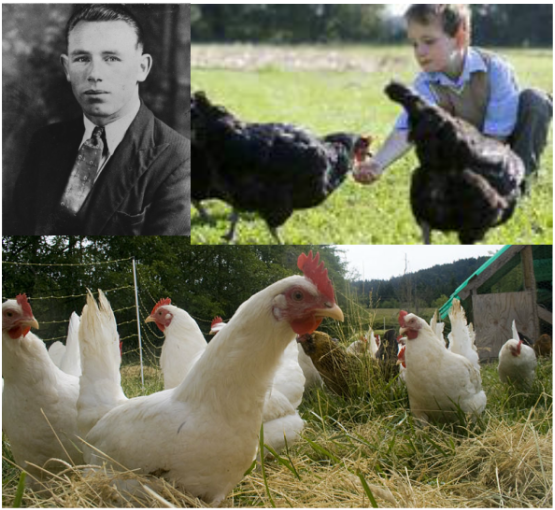
With my father never being able to advance beyond the ‘average weekly wage’ unless he worked twenty hours overtime, we were naturally brought up on the cheaper cuts of meat; that is to say when we were fortunate enough to have more than corn beef for the family table. For the most part, we depended on the staple diet that most poor Irish families have existed on for the past four hundred years; potatoes and cabbage know to the Irish as (Colcannon).
And, if you were still hungry after eating a plate of spuds, there'd always be more potatoes and cabbage to satisfy the hunger pangs.
One of my fondest memories as a young boy living in our tied property when my father worked as a miner, was going to Bradford open market on a Saturday. We would travel on a double decker bus and spend most of the day out before returning at tea time. Our purpose was to buy some chicks. The purchased chicks would be placed in a cardbord box that had been pierced to provide air vents and dad would place thgem on my knee as we travelled home. I couldn't help myself from peeking inside the box whenever dad wasn't looking. This was one of the few occasions when I might spend time alone with dad and it made me feel very privileged.
Before we lived on the estate, we experienced the great luxuary of rearing our own hens. We were never short of eggs, even during the immediate post-war years when certain foods were still rationed, but we still couldn't indulge ourselves in eating them ourselves. The eggs were either sold or bartered to secure other family provision, but every now and then I was allowed the privilege of eating a full egg that I'd gathered, providing I ate it during my father's absence at work and never told him about it or my younger siblings! I viewed receiving this perk as simply being the natural justice of all first born who were blessed with a loving mum who believed them to be 'special'.
It was common practice in those days that the father would have an egg served to eat at the table and that the children would take it in turns to eat the cap of the egg. Consequently, we would always hope that mum took off the top of the egg as she would slice it carefully well down. If dad saw her take too much egg top off he'd complain. We never wanted dad to top his own egg as he'd just smash it with the back of a spoon!
After we moved house to live on the newly-built Windybank Estate, for the first three years my dad kept a few laying hens in the back garden. This was against council rules for house tenants, and lasted until some jealous neighbour informed the authorities. We then had to revert to buying our eggs from the shop again on ration.
And, if you were still hungry after eating a plate of spuds, there'd always be more potatoes and cabbage to satisfy the hunger pangs.
One of my fondest memories as a young boy living in our tied property when my father worked as a miner, was going to Bradford open market on a Saturday. We would travel on a double decker bus and spend most of the day out before returning at tea time. Our purpose was to buy some chicks. The purchased chicks would be placed in a cardbord box that had been pierced to provide air vents and dad would place thgem on my knee as we travelled home. I couldn't help myself from peeking inside the box whenever dad wasn't looking. This was one of the few occasions when I might spend time alone with dad and it made me feel very privileged.
Before we lived on the estate, we experienced the great luxuary of rearing our own hens. We were never short of eggs, even during the immediate post-war years when certain foods were still rationed, but we still couldn't indulge ourselves in eating them ourselves. The eggs were either sold or bartered to secure other family provision, but every now and then I was allowed the privilege of eating a full egg that I'd gathered, providing I ate it during my father's absence at work and never told him about it or my younger siblings! I viewed receiving this perk as simply being the natural justice of all first born who were blessed with a loving mum who believed them to be 'special'.
It was common practice in those days that the father would have an egg served to eat at the table and that the children would take it in turns to eat the cap of the egg. Consequently, we would always hope that mum took off the top of the egg as she would slice it carefully well down. If dad saw her take too much egg top off he'd complain. We never wanted dad to top his own egg as he'd just smash it with the back of a spoon!
After we moved house to live on the newly-built Windybank Estate, for the first three years my dad kept a few laying hens in the back garden. This was against council rules for house tenants, and lasted until some jealous neighbour informed the authorities. We then had to revert to buying our eggs from the shop again on ration.

One thing that always puzzled me however, when I now look back on those days of austerity, I can ‘never’ recall me or any other family member ever eating margarine. Along with all the other Irish families on the Estate (the Donahgue’s and the Kennedys), we always had butter to eat whether or not we could afford to get another loaf of bread to spread it on until a new day had dawned. It must be one of those Irish things that nobody knows the origin of, but I’d guess it would be to do with the quantity of salt in Irish butter. Until this day, eating margarine would literally sicken me.
I remember the very first birthday party I was invited to. It was 1951 and was at the home of the Walkers on Third Avenue. The Walkers were Roman Catholics; with the exception of Mr Walker, who wouldn't believe in the existence of anything that he 'couldn’t poke his finger in'. All Catholic families on the Estate naturally bonded by religion, just as nationality brought all the Irish families much closer in neighbourliness. Being both Irish and Catholic, our family naturally increased its circle of friends and good neighbours without any need of changing either religion or nationality.
I remember the very first birthday party I was invited to. It was 1951 and was at the home of the Walkers on Third Avenue. The Walkers were Roman Catholics; with the exception of Mr Walker, who wouldn't believe in the existence of anything that he 'couldn’t poke his finger in'. All Catholic families on the Estate naturally bonded by religion, just as nationality brought all the Irish families much closer in neighbourliness. Being both Irish and Catholic, our family naturally increased its circle of friends and good neighbours without any need of changing either religion or nationality.

It’s true that whenever an English family got into disagreement with an Irish family on the Estate, the most common insult was, “Why don’t you go back home, you Irish tinker!” Being an ethnic minority on the estate during the 1950s and early 60s at least provided one with an early experience of racial discrimination. I must confess, however, that I never heard the term 'racial discrimination' until the 70s.
Any taunts that we may have received from our English neighbours on the estate, never hardened our hearts nor closed our minds to their sufferings. My mother constantly reminded my father that we were guests in their country and that it was merely harmless banter coming from the mouth of an angry person who was out of sorts with themselves. My mother was always more charitable and forgiving than my dad. She always told us, “Don’t fear; do the right thing and they will come to see you as you are. When they show you suspicion, repay them with your trust and one day they will become your friend.” She was so right in much of what she said, and it is no surprise that everyone who was ever in her presence liked her.
Any taunts that we may have received from our English neighbours on the estate, never hardened our hearts nor closed our minds to their sufferings. My mother constantly reminded my father that we were guests in their country and that it was merely harmless banter coming from the mouth of an angry person who was out of sorts with themselves. My mother was always more charitable and forgiving than my dad. She always told us, “Don’t fear; do the right thing and they will come to see you as you are. When they show you suspicion, repay them with your trust and one day they will become your friend.” She was so right in much of what she said, and it is no surprise that everyone who was ever in her presence liked her.

My initial response to mum was one of scepticism. I was wary that if we trusted the English as she suggested, that they'd only betray our friendship at the next 'falling out' incident. Her response would be to remind me that we are all what we are and because we can't betray what we don't belong to, the only person our actions can betray is ourselves. These were very wise words from a woman of limited formal education. I must confess though as I reflect, that all of the Irish, Catholic families on the estate tended to associate more with their own kind; very much like many immigrants do today. I do however believe that we were largely responsible for introducing that wonderful custom of St Patrick's Day to the English, who simply love any excuse for an extra day of revelry and a hard night's drinking.

Back to Tony Walkers' birthday party. I was 9-years-old at the time and certain foods were still on ration following the war. When we lived in the tied-cottage before coming to live on the estate, we kept chickens. When we moved, my father brought two of his best layers with him; despite it being strictly against council-house tenancy rules. This kept the family in a supply of hard-to-get eggs until some neighbour 'grassed him up' to the housing authorities and he was obliged to get rid of his hens, which we duly ate. I attended Tony Walker’s birthday party with a present of five fresh chicken eggs which he was glad to receive.
There had initially been six fresh eggs when I'd set off, but with the aid of a sowing needle and the pin prick in the bottom of the smallest egg, I managed to suck and spit out the contents, leaving only the outer shell intact (very much as birds-egg savers would do). I imagined the look on Tony Walker's face when his mother presented him one morning with a hollow egg.
In my seventy first year of age and fifty five years after I last saw him, Tony Waker phoned me and we met up. The first time he called to visit me at home, he brought a present of half a dozen fresh eggs as he now keeps hens. Each of the six eggs were solid.
There had initially been six fresh eggs when I'd set off, but with the aid of a sowing needle and the pin prick in the bottom of the smallest egg, I managed to suck and spit out the contents, leaving only the outer shell intact (very much as birds-egg savers would do). I imagined the look on Tony Walker's face when his mother presented him one morning with a hollow egg.
In my seventy first year of age and fifty five years after I last saw him, Tony Waker phoned me and we met up. The first time he called to visit me at home, he brought a present of half a dozen fresh eggs as he now keeps hens. Each of the six eggs were solid.
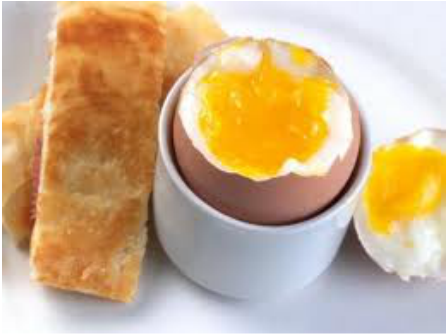
I recall during those days of food rationing that whenever my mother boiled an egg that 'the bread winner' and 'the man of the house' (my father), would get the body of the egg and me and my next two sisters would fight over whose turn it was to eat the egg top.
Some sixty years later, so many men and traditional 'bread winners', have been made redundant, with little prospects of ever working again. Many heads of households were left feeling 'unmanly' within their marriages and family homes when the country's pits, textile mills, steel works and heavy industry were subjected to mass closure. It would seem that being masculine had been equated with being a worker for so many years that the mass redundancies of the last twenty years has altered modern-day society in a way that no past tyrant or dictator ever could and has changed the structure of the nucleus family as we once knew it.
Some sixty years later, so many men and traditional 'bread winners', have been made redundant, with little prospects of ever working again. Many heads of households were left feeling 'unmanly' within their marriages and family homes when the country's pits, textile mills, steel works and heavy industry were subjected to mass closure. It would seem that being masculine had been equated with being a worker for so many years that the mass redundancies of the last twenty years has altered modern-day society in a way that no past tyrant or dictator ever could and has changed the structure of the nucleus family as we once knew it.

When I was approaching the age of 11 years, I was run over by a lorry and was unable to walk for the next three years. It was during these years that my love of reading grew and from that moment on I became a regular subscriber to the library and an avid book worm. I’d grown up in a household which had no books and where lessons of survival took precedence over matters of culture.
From my earliest of years, I can still hear the importance placed upon food and the sin of waste one had committed if ever anything was left on one's plate. I therefore grew up believing that one always needed to feed the body before the mind and only later discovered that a barren mind is starved of all natural goodness however many sacks of potatoes one can carry without taking a breather. But a mind nourished in facts, imagination, history and culture is the most ehancing and enduring aspect of body and soul.
From my earliest of years, I can still hear the importance placed upon food and the sin of waste one had committed if ever anything was left on one's plate. I therefore grew up believing that one always needed to feed the body before the mind and only later discovered that a barren mind is starved of all natural goodness however many sacks of potatoes one can carry without taking a breather. But a mind nourished in facts, imagination, history and culture is the most ehancing and enduring aspect of body and soul.

When one is born the eldest of seven children and there is barely enough food on the table each morning to feed more than four or five, one soon learns how to assert one’s position in the queue. When seven are shouting their own preferences above each other’s voices, don’t be surprised if, when you grow up, others think you to be rowing when it is no more than a mild disagreement that causes you to raise your voice! Why, even the great Lulu needed to 'Shout' before she was universally heard. We are all a product of our early upbringing. No man comes to any situation anew without a past!

When I first discovered books it was as though I’d been run over and had woken up in heaven. The mere words on the page created untold images which seemed so real; as though one was part of the story being read. The strength of the story plot possessed the power to transport a boy or girl from the 1950s back to centuries earlier. The precise words used to describe the situation or a person in the book had the capacity to change their very thought, motive or action. Indeed, the author, when at their best, was as entertaining as any magician or as deceptive as any illusionist.
For a brief escape in time, the author was capable of transporting the reader on a magic carpet around the world, setting them down in any place, at any moment in time and in any set of circumstances that awakened vivid imagination. They could even conjure up an image of transporting you to the moon so that you could kiss the man on it 'good night' or show a man upon a beach waiting for his true love to be washed back into his life by a tidal wave of love.
For a brief escape in time, the author was capable of transporting the reader on a magic carpet around the world, setting them down in any place, at any moment in time and in any set of circumstances that awakened vivid imagination. They could even conjure up an image of transporting you to the moon so that you could kiss the man on it 'good night' or show a man upon a beach waiting for his true love to be washed back into his life by a tidal wave of love.

It was true that I’d damaged my spine and was told by the doctors that I’d never walk again and yet, it would be my reading over the years ahead that would unlock the secrets of the East that were to help me find the mobility in my legs again.
I had lost all feeling below my waist and even had to manipulate my bowls for a time until the feeling below waist returned. I spent nearly nine months vividly imagining the feeling of pain returning below my waistline, as I knew that pain meant life! When it did eventually return, I knew that I would someday walk again.
Ironically, I’d lost the movement of my legs, but had in the process of doing so, found my purpose for living, although I wouldn’t become aware of the true significance of my boyhood experience until I'd matured into my thirtieth year of life and had started my professional career as a Probation Officer in West Yorkshire.
Being constantly racked with pain above my waist after my childhood accident, and then below my waist after my legs had regained their life's blood, reading pproved to be one of the few escapes and mental distractions from constant feelings of hurt. Reading enabled me to imagine more serene scenes that helped to clear the clouds above of an everyday cruel reality.
I would derive pleasure from walking down my woodland path; an imagined scene that I would use in my relaxation training classes over twenty years later. This would be a tape that would help tense people to sleep better as well as to relax, and over ten years between 1990-2000, I freely gave away over 5000 copies of this tape to people who attended my relaxation classes and any stressed person who requested one. The tape lasts 45 minutes and can be freely listened to or downloaded below. I would advise approximately one month's daily practice before benefits become noticable. Please note however that although the tape was professionally produced and recorded in 1972, it is now 45 years old.
Reading enabled me to stretch the boundaries of my mind to far continents and to learn the different ways of both looking at and dealing with similar states of being and aspects of my condition from the physical, psychological, mental and spiritual viewpoints. My physical body growth may have stagnated, but my mind and thought processes had gone far ahead of my years. It may have seemed to others at the time that I was snatching at straws, but when western medicine cannot seem to offer one any prospects of ever walking again, it is not unusual to turn to eastern medicine and traditions for possible answers. I do accept however that it is most unusual for a twelve year old boy to do so! Today I hold a more eclectic view and approach to most matters. My general philosopy has been shaped by forty years as a Relaxation Trainer, Stress Management Worker, Behaviour and Cogitive Modifier and Anger Management Worker.
I had lost all feeling below my waist and even had to manipulate my bowls for a time until the feeling below waist returned. I spent nearly nine months vividly imagining the feeling of pain returning below my waistline, as I knew that pain meant life! When it did eventually return, I knew that I would someday walk again.
Ironically, I’d lost the movement of my legs, but had in the process of doing so, found my purpose for living, although I wouldn’t become aware of the true significance of my boyhood experience until I'd matured into my thirtieth year of life and had started my professional career as a Probation Officer in West Yorkshire.
Being constantly racked with pain above my waist after my childhood accident, and then below my waist after my legs had regained their life's blood, reading pproved to be one of the few escapes and mental distractions from constant feelings of hurt. Reading enabled me to imagine more serene scenes that helped to clear the clouds above of an everyday cruel reality.
I would derive pleasure from walking down my woodland path; an imagined scene that I would use in my relaxation training classes over twenty years later. This would be a tape that would help tense people to sleep better as well as to relax, and over ten years between 1990-2000, I freely gave away over 5000 copies of this tape to people who attended my relaxation classes and any stressed person who requested one. The tape lasts 45 minutes and can be freely listened to or downloaded below. I would advise approximately one month's daily practice before benefits become noticable. Please note however that although the tape was professionally produced and recorded in 1972, it is now 45 years old.
Reading enabled me to stretch the boundaries of my mind to far continents and to learn the different ways of both looking at and dealing with similar states of being and aspects of my condition from the physical, psychological, mental and spiritual viewpoints. My physical body growth may have stagnated, but my mind and thought processes had gone far ahead of my years. It may have seemed to others at the time that I was snatching at straws, but when western medicine cannot seem to offer one any prospects of ever walking again, it is not unusual to turn to eastern medicine and traditions for possible answers. I do accept however that it is most unusual for a twelve year old boy to do so! Today I hold a more eclectic view and approach to most matters. My general philosopy has been shaped by forty years as a Relaxation Trainer, Stress Management Worker, Behaviour and Cogitive Modifier and Anger Management Worker.

I remained living on Windybank Estate until I went to Canada at the age of twenty-one years. When I returned from Canada some two years later, I had changed too much ever to naturally fit back into life living on the estate. My values had changed, my speech had changed; even my table manners had changed, along with my upwardly mobile aspirations. In truth, I’d substantially changed in attitude and worldly direction and was in the process of changing farther. Without realising it at the time, I was inwardly wanting to join the ranks of the middle classes; something that I'd later inwardly resent and come to view as an act of 'cultural betrayal'.

Whilst out in Canada, I was to meet the first real love of my life, Jenny. Jenny was an 18-year-old girl and it was this relationship that was largely responsible for many changes of aspiration that occurred in me. Had it not been for Jenny, a keen horse rider, I may never have learnt to ride, as that seemed the best way of catching her at the time.
Jenny was the daughter of the British Trade Commissioner stationed there and although her parents accepted me as much as any prospective in-laws ever could, I soon realised that we'd both been born into different worlds and had naturally developed very different expectations from our backgrounds. Believing that I would never be able to keep her in a manner to which she'd grown accustomed, I cut my losses and headed back home to West Yorkshire, England, very much heartbroken.
Looking back at the decision I made then, I would never make the same decision today as I think much better of myself now, but that was then and this is now!
I am now able to look back on that momentous decision I took then to end a budding relationship before it developed into full flower and wonder how it might have turned out had I been brave enough to follow my heart instead of my head?
Jenny was the daughter of the British Trade Commissioner stationed there and although her parents accepted me as much as any prospective in-laws ever could, I soon realised that we'd both been born into different worlds and had naturally developed very different expectations from our backgrounds. Believing that I would never be able to keep her in a manner to which she'd grown accustomed, I cut my losses and headed back home to West Yorkshire, England, very much heartbroken.
Looking back at the decision I made then, I would never make the same decision today as I think much better of myself now, but that was then and this is now!
I am now able to look back on that momentous decision I took then to end a budding relationship before it developed into full flower and wonder how it might have turned out had I been brave enough to follow my heart instead of my head?
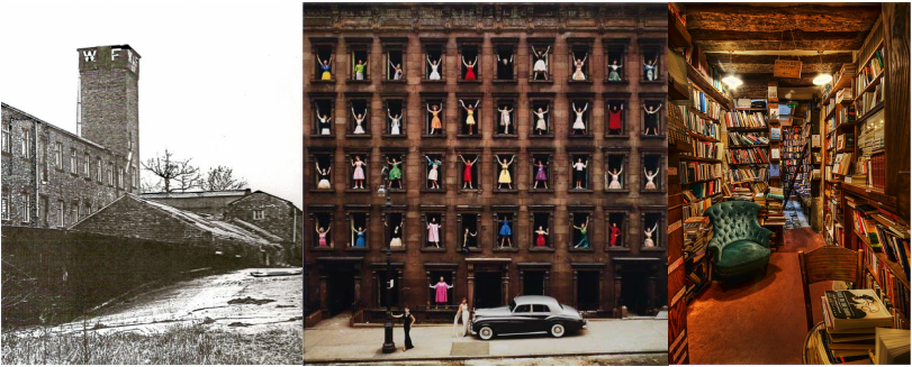
Within a matter of eight years, I'd become a much different man to the hot-headed individual who'd gone to Canada in search of adventure at the age of twenty-one years. The man, who’d become the youngest shop steward in Great Britain at the age of eighteen years now became a mill manager and joined the ranks of the bosses before his twenty-fifth birthday. I even held out dreams of one day owning my own mill and calling it, 'William Forde Textiles.'
I had lived the first twenty-one years of my life as a red-hot socialist and before I was thirty I had turned liberal and then settled in the colours of Tory blue. I had probably dated all the unmarried females on the estate between sixteen and twenty-one years of age and couldn't pass a street without female admirers spying on me from their windows. Now I was ready for settling down to married life with one woman.
During my upbringing, I'd never came across a book in the family home apart from the comics that all boys had; the Dandy, the Hotspur and the Beano. My thirst for knowledge eventually led me into my obsession with books and reading. I started to spend my leisure hours with a book in my hands and any spare time I had, I would be hunting around old book shops for those subjects that modern day books didn't contain, subjects like the art of public speaking etc. All my spare money went to buy books and soon I was reading a book a day. Before I was thirty years old, I had acquired a library (mostly historical and biographical) of over 6,000 books! Whereas today, every spare inch of wall space in my house is taken up with paintings, way back in the 70s, it would have been books!
I had lived the first twenty-one years of my life as a red-hot socialist and before I was thirty I had turned liberal and then settled in the colours of Tory blue. I had probably dated all the unmarried females on the estate between sixteen and twenty-one years of age and couldn't pass a street without female admirers spying on me from their windows. Now I was ready for settling down to married life with one woman.
During my upbringing, I'd never came across a book in the family home apart from the comics that all boys had; the Dandy, the Hotspur and the Beano. My thirst for knowledge eventually led me into my obsession with books and reading. I started to spend my leisure hours with a book in my hands and any spare time I had, I would be hunting around old book shops for those subjects that modern day books didn't contain, subjects like the art of public speaking etc. All my spare money went to buy books and soon I was reading a book a day. Before I was thirty years old, I had acquired a library (mostly historical and biographical) of over 6,000 books! Whereas today, every spare inch of wall space in my house is taken up with paintings, way back in the 70s, it would have been books!
I had loved the estate and the family I'd been born into. I loved the environment where I’d grown up as boy and young man, but I now found myself as a man with dreams of a better life; a man ready to move on and away from my background to establish roots elsewhere. My aspirations and dreams for the future had significantly changed since my travels and experiences in Canada had completed the final spurt of my growth from young man to adult. I soon discovered that I'd now grown out of the estate in which I'd grown up in and its cultural expectations and aspirations. I found myself on an 'aspirational staircase' that would lead me to another type of life. It was but a matter of time however, that my background returned to remind me of my purpose on this earth.
With advancing age and changing health I now came to see my daily purpose as bringing hope into the lives of others by spreading the Gospel of being positive in all that we say and do.
Today, whenever I want to remember my roots, I am aided by the beautiful interpretation and version of the classical, 'Nessun Dorma' sung by the great Neil Sedaka. If you think that only trained classical singers can perform this song, you would be wrong, but be warned; if you are grieving the loss of a beloved father or family times past, it will probably make you cry.
With advancing age and changing health I now came to see my daily purpose as bringing hope into the lives of others by spreading the Gospel of being positive in all that we say and do.
Today, whenever I want to remember my roots, I am aided by the beautiful interpretation and version of the classical, 'Nessun Dorma' sung by the great Neil Sedaka. If you think that only trained classical singers can perform this song, you would be wrong, but be warned; if you are grieving the loss of a beloved father or family times past, it will probably make you cry.
William Forde: September, 2012. Amended April, 2018.

